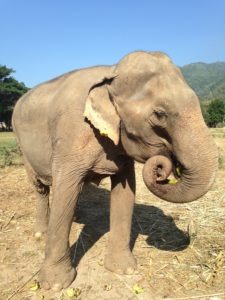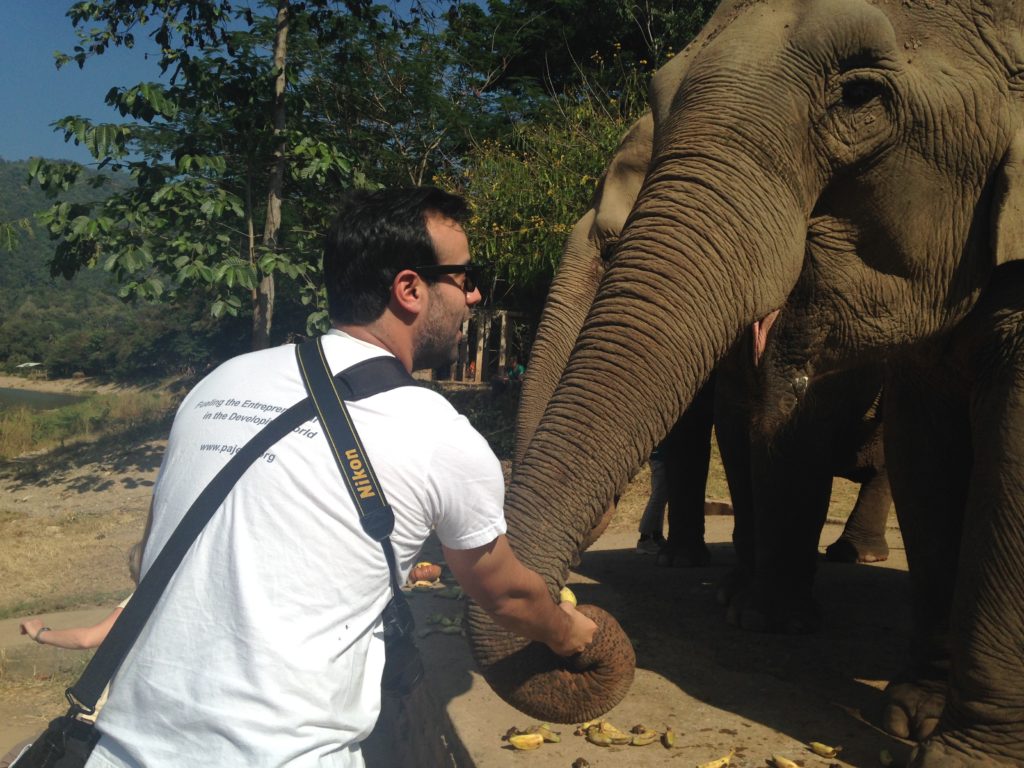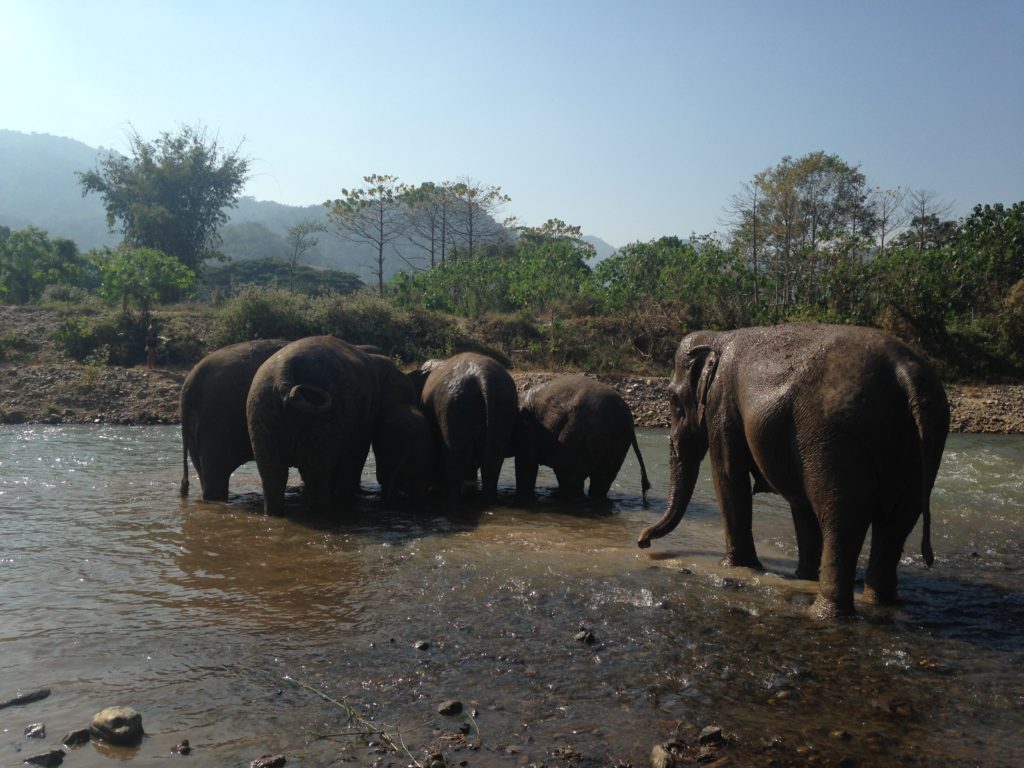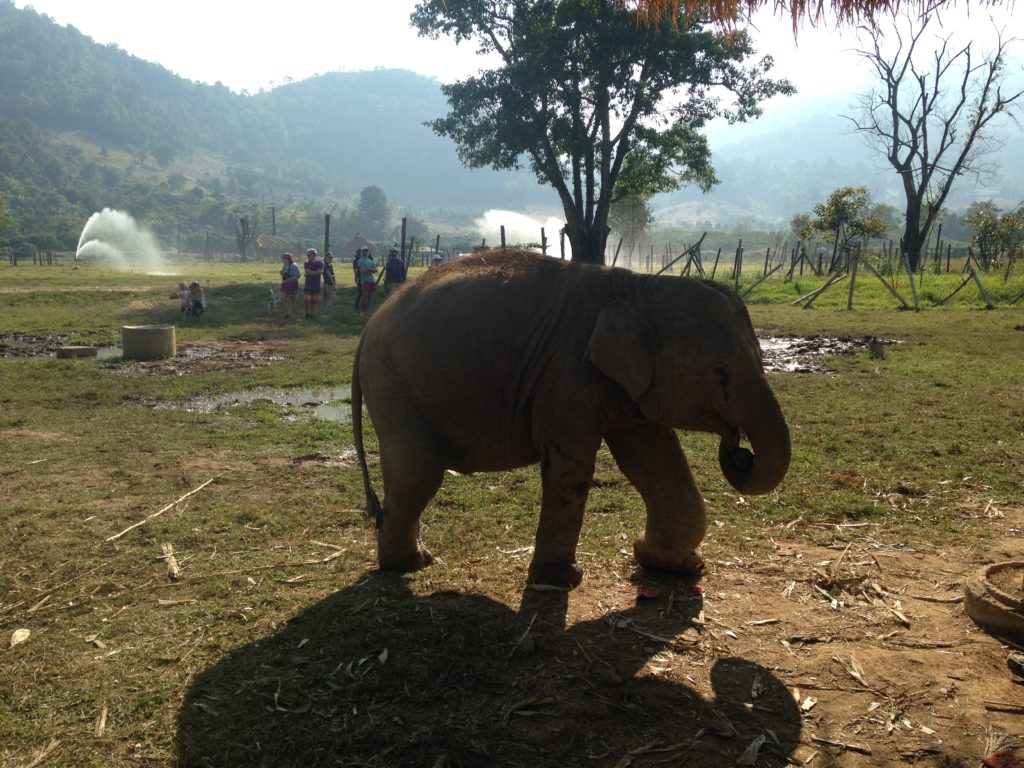 Elephant imagery is ubiquitous in Thailand. The animal takes on the form of the god Ganesh in Hinduism, and while Thailand is 95% Buddhist, Indian religious influence is clear. The sad irony of the situation is that the Asian elephant is in dire straights in Thailand. It is estimated that at the turn of the 20th Century, there were 100,000 elephants in Thailand. That number has plunged dramatically to an estimated 5,000 today. Of these, about 2,000 are in the wild and 3,000 in captivity as domestic elephants. A dismal situation became even worse following the Thai ban on logging in 1989, when many of the working domestic elephants were suddenly out of a job. With a fixed cost and an income stream suddenly threatened, elephant owners either abandoned their animals or brought them into big cities such as Bangkok where they would entertain tourists on the loud, crowded streets for change. These elephants didn’t eat enough, didn’t bathe enough, they walked on polluted city streets, and breathed congested air. It was a horrible existence for these majestic beasts that are meant to naturally roam the forests. This practice has since been banned, and fortunately, Thai cities are essentially elephant free today.
Elephant imagery is ubiquitous in Thailand. The animal takes on the form of the god Ganesh in Hinduism, and while Thailand is 95% Buddhist, Indian religious influence is clear. The sad irony of the situation is that the Asian elephant is in dire straights in Thailand. It is estimated that at the turn of the 20th Century, there were 100,000 elephants in Thailand. That number has plunged dramatically to an estimated 5,000 today. Of these, about 2,000 are in the wild and 3,000 in captivity as domestic elephants. A dismal situation became even worse following the Thai ban on logging in 1989, when many of the working domestic elephants were suddenly out of a job. With a fixed cost and an income stream suddenly threatened, elephant owners either abandoned their animals or brought them into big cities such as Bangkok where they would entertain tourists on the loud, crowded streets for change. These elephants didn’t eat enough, didn’t bathe enough, they walked on polluted city streets, and breathed congested air. It was a horrible existence for these majestic beasts that are meant to naturally roam the forests. This practice has since been banned, and fortunately, Thai cities are essentially elephant free today.
My girlfriend loves elephants. From the first day I met her, this passion was apparent. Her dream in life has always been to see an elephant in the wild, or within a humane environment. Trying to find a conscious place to see and interact with these animals was no easy task. Ultimately, we found a wonderful place called Elephant Nature Park, started by an exceptional woman, Lek Chailert. She was born in one of the many hill tribe villages around Chiang Mai in northern Thailand, and became close with elephants after her grandfather, who was a shaman, received one as a gift for helping a local person through sickness. Cognizant of the plight of Thai elephants, Lek started Elephant Nature Park in 1996 to rescue abused, old, abandoned and orphaned elephants. The park is now home to 43 of these magnificent animals, some more than eighty years old, along with some babies. In fact, five elephants have been born in the park since it opened.
Many elephant-centric tourist venues in Thailand claim that the elephants are treated well, but Elephant Nature Park lives up to its claims. While the interaction with the animals is intimate and intense, they aren’t forced to do anything they don’t want to. Food is certainly employed as a method to encourage close contact with humans, but you don’t get the sense that they are made to do anything. In fact, there is almost no interaction with male elephants because they simply aren’t as friendly or aren’t as interested in us as the females are. Similarly, some of the females are far more gregarious and playful than others.
Consistent with the spirit of freedom the park wishes to instill within the resident elephant population, each new arrival wanders around the 250 acre property and engages in a process during which they ultimately either join an existing family or stay on their own. While the vast majority of these elephants are not genetically related, it’s a beautiful thing to watch them form new family groups at the park. Remarkably, many of these families, or life-long friendships, actually consist of one elephant helping out another less fortunate animal. Take for instance Jokia, an elephant from the Thai-Myanmar border who was blinded in both eyes as a result of abuse from her previous owner. Upon arriving at Elephant Nature Park, Jokia befriended another female elephant who now stays at her side constantly, helping her get around safely and comfortably.
You learn a lot at the park, but much of the information is sad, particularly when you hear about the gut wrenching past of many of these beasts. The injuries are obvious. We saw several elephants with deformed legs and feet courtesy of having stepped on land mines. Broken hips were another common injury as a result of them being forced into hard labor on behalf of previous human owners. As sad as all that was, it was reassuring to know that they are safe and happy now.
The most important aspect of Elephant Nature Park is that the animals do not have to work. No tricks for tourists, no elephant rides, no manual labor. Tourists choose this place specifically to see them roaming free and to feed and bathe them – two things elephants naturally love to do anyway. I must have fed at least 20 watermelons and countless bananas to several very appreciative females. Watching a baby ellie take a mud bath and a family of eight cross the river were some other highlights. To hug these giants, to touch their coarse skin and feel their powerful trunks take bananas from your hand with a strength that could crush your arm effortlessly is an experience I’ll never forget. Here are a few photos from our adventure:
Me feeding an elephant:

An elephant family crossing the river:

A baby elephant whose left leg was deformed from stepping in a poacher’s trap:

Elephant Nature Park is part of a rapidly growing niche in the tourism industry known as “eco tourism.” When done properly, eco tourists end up leaving the places they visit better off than before they came. In addition to saving elephants from tragic life circumstances, the enormous quantity of food purchased to feed the pachyderms are sourced from local farmers. This is a project I suggest you consider supporting and definitely visiting if you ever find yourself in Thailand.
What follows are three videos. The first one is hard to watch. It shows some of the horrific abuse that domestic elephants undergo during the training process, in which they are beaten and forced into “crush boxes” in order to break their free will. The next two are encouraging and heart-warming examples of how love and consciousness can ultimately make life better for Thailand’s remaining elephants.
Note: Due to a busy schedule, extreme time zone differences and unreliable WiFi, posting has been much more difficult than I expected. I will continue to post as time and events permit.
In Liberty,
Michael Krieger
Donate bitcoins: 35DBUbbAQHTqbDaAc5mAaN6BqwA2AxuE7G
Follow me on Twitter.



How can we help the Elephant Nature Park? Do they accept donations via PayPal?
Hi Jon, unfortunately there doesn’t appear to be an easy way to directly donate to Elephant Nature Park. The donation process is a bit more convoluted than I thought when I wrote the post. See: http://www.elephantnaturepark.org/how-you-can-help/funding-policy/
You may want to contact them directly and see what the deal is: http://www.elephantnaturepark.org/contact/contact-us/
Thank you for the interesting story Michael. Does your girlfriend know about the nursing home sanctuary for elephants in Tennessee? It is near Hoenwald and is the place where elephants from around the world go to be taken care of without having to work. Too old and sick for the circus, or end-stage out of a zoo, etc. The wait-list to volunteer is years long and people grow their special native species greens and really do a good job taking care of them on thousands of acres in South-Central TN. It is a real inspiring story too and maybe some place you guys might like to visit on some cross-country trek.
Hi Ariel, thanks for the note! Yes, she is aware of the sanctuary there. In fact, she is from Tennessee and looked into volunteering at it before she moved out to Colorado, but never had the chance. Here is a link to it for anyone who is interested: http: http://www.elephants.com
Thanks Michael. Some day we hope to live in Thailand and we will definitely visit this elephant sanctuary. These majestic animals have always held a special place in my heart.
Yes, they truly are incredible. Planet earth simply wouldn’t be the same without them.
God bless you I am happy somebody could explain to you in English. Enjoy your time away…makes me miss it especially the New Year’s Eve Fireworks one the beach in 80 degrees! Argh!
man. i’m glad you’re enjoying vacation. you have discovered there is suffering everywhere you go and you want your website to be a feel bad about the suffering everywhere website.
there is too much suffering kreiger. if you take it all on your shoulders it will destroy you. try and enjoy the vacation! elephants are awesome!. enjoy them while they are still not extinct. we may be amongst the last generations of homo sapien to interact with our large and historically edible friends the eliphantidae elephas ( the asian elephant ) and the african elephants.
[ it is my humble opinion that man kind will render all large wild terrestrial mammals extinct fairly soon. readup on przewalski’s horse, it is an interesting story ].
the most numerous non human large animals in the world are by far cows and pigs and then of course chickens and other farmed animals comprise a staggering amount of global biomass.
we have changed the character of the planet by creating a rapidly growing large amount of people we call our 7 billion person civilization.
but don’t worry—the insects will be fine so long as we dont’ run out of mammalian and avian protein.
try eating some bugs while you’re in thailand. see how you like it no?
Mike. Thanks for sharing this story. My wife and I visited the park a few years ago during our vacation to Thailand. It was the highlight of the trip.
Thanks for all the work you put into your website. Enjoy the rest of your vacation.
Thanks so much Bret, glad you enjoyed the story and happy to hear you visited it.
Thank you for your wonderful post. A friend and I volunteered at ENP for a week in December. The volunteer experience was one I will never forget. Along with the elephants it is was great to interact with all the fabulous people, cats and the dogs. I highly recommend this experience for anyone visiting Northern Thailand.